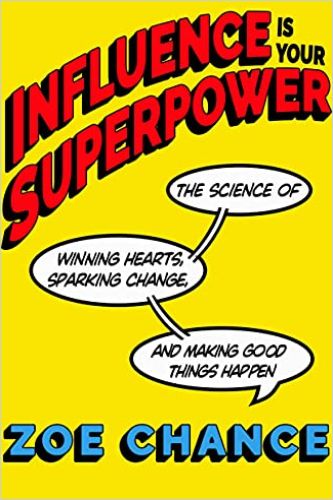Influence doesn’t have to be tacky, greedy or corrupt. Renowned Yale professor Zoe Chance offers an alternative: research-based insights into influence that nice people will feel comfortable putting into practice. Chance shows why an ethical, collaborative approach works best.

Influence for Nice People
For most people, influence means manipulation: a distasteful and even unethical practice. But the power of influence is undeniable – and as celebrated marketing professor Zoe Chance teaches it, with the right mind-set, influence can serve as a force for good. Chance’s class “Mastering Influence and Persuasion” is the most popular course at the Yale School of Management, not only because Chance teaches future executives how to wield personal and professional power but because her take offers a refreshingly ethical approach to the subject.
Chance’s framework, described in her smart, insight-packed guide, eschews win-lose scenarios in favor of outcomes that benefit all. Her approach incorporates listening and empathy, and it calls on readers to exercise their influence for positive impact. Along the way, Chance reveals the secrets to building charisma while offering actionable tactics and tools. For instance, she teaches how to frame a request, how to negotiate creatively and responsibly, and how to spot liars and exploiters.
Influence doesn’t flow to those who deserve it but to those who understand and practice it.
Building and exercising influence doesn’t mean turning your back on your values, and it needn’t cause people to dislike you, Chance argues. Indeed, learning to deploy influence on behalf of an idea, a vision, and your own and others’ best interests can make you the kind of person other people look to for leadership and results.
Two Brains
Chance builds her framework on a foundation of solid research in cognitive and behavioral psychology, pointing to the centrality of people’s subconscious, instinctive mental processes. A primary source is the work of Nobel Prize–winning behavioral economist Daniel Kahneman. In his best-selling guide, Thinking, Fast and Slow, Kahneman posits two systems for thinking, which he calls System 1 and System 2. System 1 thinking is instinctive, subconscious, automatic and fast. Like an alligator that’s only interested in self-preservation, it’s a primal cognitive response to stimuli, opportunity and threats. This is the “Gator brain.” System 2, the “Judge brain,” is responsible for cognitive tasks requiring deep consideration and slow, effortful deliberation, such as planning, strategizing, analyzing, learning new skills and figuring out complex instructions.
The Gator can make decisions without input from the Judge, but the Judge can’t make decisions without input from the Gator. This asymmetry is one of the keys to influence.
Psychological research suggests that the Gator brain might be responsible for up to 95% of people’s decision-making, Chance says. And even when faced with facts and figures, the Gator exerts a powerful influence.
In an interview for Yale News, Chance explained it this way: “We experience ourselves as living life in Judge mode because it’s conscious, but it’s only responsible for a sliver of our behavior and is vastly influenced by the Gator…We think we’re making objective, rational decisions, but a lot of what we’re doing is rationalizing the preferences of the Gator.”
Thus, Chance recommends directing influence primarily to people’s Gator brain – their unconscious emotions and instincts. Only after getting the Gator’s attention should you appeal to the Judge. This approach underlies many of the tactics Chance suggests, such as the use of nudges, removing obstacles from the path you wish people to take, setting frames to mold expectations and shape opinions, and the smart, ethical management of objections and resistance.
Just Ask
Chance points out that greater influence often is only an ask away: Asking for what you want is the most straightforward route to becoming more influential. In several experiments she cites, researchers found that people are surprisingly willing to help a stranger who asks. That’s because helping others releases a rush of dopamine, stimulating the brain’s reward system. In other words, it feels good to perform an act of kindness. People also might hesitate to say no for a variety of reasons: They don’t want to be rude or miss an opportunity, or they seek a reciprocal favor.
People who ask for what they want get better grades, more raises and promotions, bigger job opportunities, and even more orgasms.
But for many people, a fear of rejection prevents them from even asking. The antidote, Chance says, is to learn that you can survive rejection: Consequently, you’ll feel empowered to make requests without fear. Chance relates the journey of entrepreneur wannabe Jia Jiang, who documented his efforts to embrace rejection in a video blog called 100 Days of Rejection Therapy. Every day, Jiang made outlandish requests, such as asking for permission to make an announcement over Costco’s intercom or to borrow a dog from the Humane Society. Over time, he became more comfortable with rejection, and he was surprised at how often people granted his bizarre appeals.
Cultivate Charisma
Influence is a matter of who you are as much as what you do, Chance suggests, and she highlights the links between confidence and charisma. Boosting your confidence authentically has to come first, she suggests, because true confidence will lead you to come across as charismatic in social situations. On the other hand, attempting to fake charisma will turn people off.
Chance offers some simple changes in speech and behavior that can build your confidence and charisma, such as reducing the use of diminishers (“I’m sorry, but…,” “I just thought…”), changing your focus from yourself to others, and pausing while you speak.
Being influential gives us the ability to create change, direct resources, and move hearts and minds.
Throughout, Chance emphasizes influence as a natural, human form of power that can pave the way to connection, prosperity and happiness. The forceful and often combative approach of many classic authors on influence just doesn’t work well in many contexts, Chance argues, whereas listening, collaborating and offering respect tend to win people’s buy-in. And a more benevolent form of influence will inspire positive intangible effects such as trust and engagement.
In essence, Chance aims to empower “kind, smart” people to exert more influence in the workplace and in the world. Putting more power in the hands of nice people sounds like a win-win.




